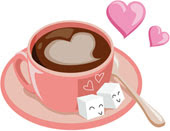Happy Songkran Day!
sùksăn wan song-graan
(สุขสันต์วันสงกรานต์)
The Songkran festival is celebrated in Thailand as the traditional New Year's Day from 13 to 15 April. It coincides with the New Year of many calendars of South and Southeast Asia.
The date of the festival was originally set by astrological calculation, but it is now fixed. If these days fall on a weekend, the missed days off are taken on the weekdays immediately following. If they fall in the middle of the week, many Thai take off from the previous Friday until the following Monday. Songkran falls in the hottest time of the year in Thailand, at the end of the dry season. Until 1888 the Thai New Year was the beginning of the year in Thailand; thereafter 1 April was used until 1940. 1 January is now the beginning of the year. The traditional Thai New Year has been a national holiday since then.
The traditions of this festival.
water-splashing = การสาดน้ำ (gaan sàad náam)
> to splash/ throw water on each other
= สาดน้ำใส่กัน (sàad náam sài gan)
> water pistol = ปืนฉีดน้ำ (bpeun chìid náam)
* to squirt water = chìid náam (ฉีดน้ำ)
merit-making rituals
= พิธีทำบุญ
(phí-thee thambun)
* make merit = ทำบุญ (thambun)
procession of Buddha images
= ขบวนแห่พระพุทธรูป
(khà-buan hàe phrá phút-thá-rôop)
* Buddha image = พระพุทธรูป ( phrá phút-thá-rôop)
to bathe water onto a Buddha image
= สรงน้ำพระ
(sŏng náam phrá)
pour water onto the hands of the elderly
= รดน้ำดำหัว
(rót náam dam hŭa)
build the sand Chedi
= ก่อเจดีย์ทราย
(gòr jay-dee saay)
release birds and fish
= ปล่อยนกปล่อยปลา
(bplòi nók bplòi bplaa)
Source: wikipedia, Google












No comments:
Post a Comment